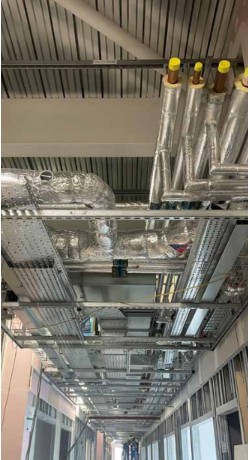Construction of a new Urgent and Emergency Care Centre at Walsall Manor Hospital has adopted an offsite approach to MEP provision to award-winning effect.
The new Urgent and Emergency Care Centre at Walsall Manor Hospital is to replace the current building whose physical environment struggles to meet increasing patient flow demands.
The new development, which has maximised MEP offsite engineering, incorporates a new emergency department with 'front door' access to a new Urgent Treatment Centre and Paediatric Assessment Unit with the first floor accommodating a new Acute Medical Unit. The new multi-million-pound facility has significantly embraced offsite engineering strategies for the MEP services resulting in enhanced programme delivery, improved health and safety, increased supply chain collaboration and efficient sustainable delivery.
With offsite manufacturing and lean construction rooted within main contractor Tilbury Douglas Engineering's culture, offsite solutions were embedded in the delivery strategy for safely, efficiently, and sustainably delivering key MEP elements of the project. Taking advantage of pre-manufactured solutions to provide the Trust with low-risk, repeatable results in controlled environments, the project was also an early adopter of the NHS MMC Business Case compliance requirements acting as another driver for maximising MEP MMC offsite opportunities.
The offsite strategy was reviewed during the preconstruction phase undertaking specific MMC/offsite workshops and opportunity and risk analysis to identify areas where offsite solutions would add value to the MEP installation resulting in the delivery of 120 horizontal floor modules, packaged plantroom skids for LTHW plant/pipework, pumpsets, boosted cold water, medical gas plant skids, 1 50 prefabricated distribution boards and 110 prewired and pre-plumbed bedhead trunking units. Moving into the construction phase, collaboration was required between the offsite partners, plant suppliers and key sub-contractors including ductwork and thermal insulation, and controls.
Plant skid and module manufacturing programmes were collaboratively developed with all stakeholders in line with the overall construction programme. Collaboration of suppliers and subcontractors was undertaken at the offsite manufacturing facility for production of the corridor modules and plant skids which required sub contractors to integrate into partners manufacturing, H&S, and delivery processes.
The offsite approach has promoted collaboration across the supply chain for integrated delivery of the offsite elements. Specific examples include integration of key supply chain members into an online BIM collaboration environment for module co-ordination as well as collaborative factory manufacturing programmes and factory installation processes. The offsite approach has enhanced sustainability through reduced carbon impact from site deliveries and site trades travelling to site totalling a saving of 7.73 tonnes of CO2.
The factory fabrication has reduced on-site risk of injury by removing 7,000 hours offsite of which 5,355 were working at height which we always look to minimise where possible due to the increased risk. The offsite MEP solutions enabled programme acceleration of the MEP services whilst the build elements were simultaneously being constructed without MEP trade impediment/ co-ordination. Overall, this saved 7,000 hours on-site equating to a programme efficiency of 18 weeks.
The new facility will enhance clinical staff efficiency, provide improved quality of care, improved patient experience, and a much-improved working environment for staff. The overall project and offsite solutions are being delivered within budget and the project is on target for successful timely completion.









